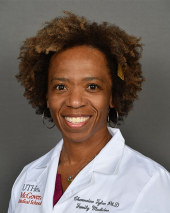Leading by example.
Does it make a difference for a community to see leaders, athletes, and other high-profile individuals taking time off and publicly sharing it relates to mental health?
Chermaine Tyler, PhD, psychologist with UT Physicians, really hopes it does. She says Simone Biles is a great example of the value of mentally taking a break. Biles took the time off, very openly, stating it was because of her emotional and mental health.

“Then we see her really take time off,” said Tyler, assistant professor in the Department of Family Medicine at McGovern Medical School at UTHealth Houston. “We know she got married, and there were other things happening in her life; she wasn’t on complete pause. But she comes back and wins her eighth U.S. Gymnastics Championships all-around title. Something good clearly came out of that.”
Another example is Harris County Judge Lina Hidalgo, who took a temporary leave of absence in August to get the treatment she needed for depression. Tyler believes it sends the message that treatment can be effective, and it helps people address challenges.
“So, whatever it is that makes people feel like they can’t do their jobs the way they want — they get help, they come back, and they’re better and stronger than ever,” Tyler said.
Why a different perception?
Why is getting help for mental illness any different than getting help for a physical illness? Tyler believes part of it relates to the culture, but she believes it is shifting.
Tyler describes this shift as some of the good that came out of the pandemic. It’s an awareness of being able to say, “I don’t feel like myself” or “Something feels different.” This helps people connect those feelings with mental health conditions, which has been useful, she said. She points to health care professionals using social media to help people understand signs of depression as a great educational tool.
Mental Health America provides free and accessible information to get the word out, Tyler said. The organization offers online screening tools and information on a variety of conditions and their symptoms.
“I think that is a huge part of why people have never sought help before,” Tyler said. “They didn’t even know it was a condition where you could get help.”
First steps
Tyler recommends those seeking help to really lean into their support systems. Doing first steps that are scary or confusing are more doable, Tyler said, with social support — whether it’s a friend, family member, neighbor, colleague, or health care provider.
But sometimes people don’t know where to start in finding a psychologist, psychiatrist, or therapist for assistance. Tyler said primary care providers are an excellent place to look for guidance or direction.
In Tyler’s primary care clinic, for example, there is a social worker within the clinic and a large team-based practice that help people with many different types of concerns they have when they seek health care. She says many community-based clinics are similar and do a good job getting individuals connected with others who can help.
Getting treatment is not a stigma, Tyler said. It’s to help you get back to functioning the way you want and need to, she said.
“The more we can send a message to the general public that it’s people of different ages and different professions who struggle with these conditions, the better,” Tyler said. “They speak out about it, they get help, and we watch them continue to thrive. I think it’s definitely a step in the right direction.”


